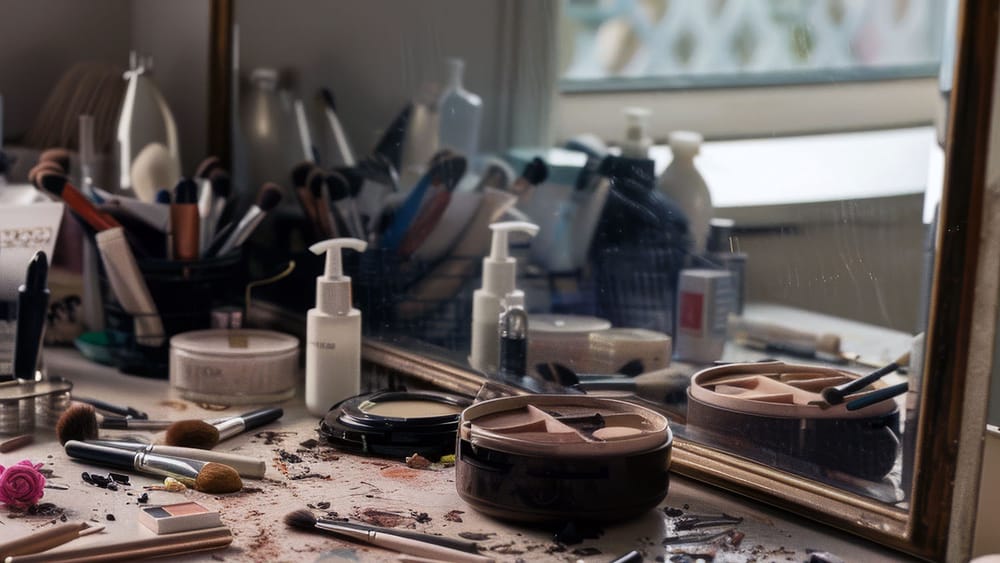In the face of the many seemingly unsolvable problems of the world, it takes courage, faith and determination to take on the role of a superhero. Colours of a Changemaker is a series of interviews with Black, Indigenous and People of Colour from around the world who are using their vocation to create social and environmental change. As Gandhi once said, we must be the change we want to see in the world, and these changemakers are doing just that through their art, music, written works, social platforms and much more.
Aja Barber is a writer, stylist, and outspoken sustainability advocate working to deconstruct our flawed ways of thinking one Instagram caption at a time. Barber's work has been featured in such outlets as The Guardian, Eco-Age, CNN and Al Jazeera. She has been an outspoken voice on the hyper-consumerism and fat-phobia that rule the fashion industry and a critic of the inequalities that have been baked into just about every other aspect of society as well. Her book Consumed: The Need for Collective Change: Colonialism, Climate Change, and Consumerism is available now. In this interview, Aja answers our questions about what a more sustainable future looks like and how the fashion industry can choose to be a part of it.
How much impact do you believe brands can have on a larger societal view of bigger bodies by shifting their advertising and size offering?
Brand involvement in the conversation against fatphobia is absolutely crucial. There's this idea in the fashion industry that the fat body isn't desirable or aspirational in any way, shape or form. It's rooted in fatphobia [so] more visibility of bigger bodied people enjoying and having a beautiful life is so necessary to having a world where we can all buy clothing that we want and buy clothing that makes us feel good.
Have you seen the beauty magazine industry move in any significant way towards a more inclusive vision of body standards or a meaningful promotion of sustainability?
I feel like the beauty industry is just scratching the surface of sustainability. The beauty industry uses a lot of plastic and the visibility as far as diversity isn't where it should be. And so I think the beauty industry could definitely be doing better.
You have a new book coming out, Consumed: The Need for Collective Change: Colonialism, Climate Change and Consumerism. Was there anything that surprised you during your research for the project? Any discoveries that spurred a greater outrage at the industry than before?
I would say the idea that 15 million items of discarded clothing arrive in Kantamanto Market every single week, coupled with the [estimate] that 18 million Americans suffer from a spending addiction, the math is really checking out for me about what the cause of this problem is and why we're in this mess. And so that was a surprising revelation for me.
What inspired you to put pen to paper and translate your advocacy into a book?
I think that a book is something that is so much different than social media. We treat books differently in our society. There are also people that don't engage in social media in the same ways as some of us do. You can give them a book; a tangible thing, that you can pass on to a friend. I think it's really important to get the conversations that we've been having off of social media and into different spaces because that's how we create actual legit change.
Can you talk a little bit about the link between overconsumption and fast fashion? In what ways do the business models of these major fast fashion brands promote a psychology of waste and endless want?
Well that one's an easy one. If you're offering the general public new items every day, 365 days a year, you are training citizens to shop like no tomorrow and encouraging it. So I remember reading in Lucy Siegle's book [To Die For: Is Fashion Wearing Out the World?] that when Zara first opened people would go into the store and say, "That's nice, maybe I'll come back for it next week, I'm not sure.” And the sales associates would go, “Well, you know, we change our merchandise so much that it might not be here next week.” So when you have that sort of encouragement to spend in the moment, coupled with the fact that on social media you are being constantly sold to—you are getting emails every single day telling you to buy buy buy. I think it's a little bit dishonest when fast fashion companies say that they're responding to consumer demand because I would argue that they've created that demand.
In response to the argument that sustainable fashion is not often affordable, therefore not accessible, can you provide a framework of how collective action can help to address this?
Okay, so here's the thing. Fifty percent of the planet lives on [US] $5.50 a day, which means that they are not the ones buying fast fashion. Additionally, if you look at the top of the fast fashion food chains, so to speak, it's pretty bloated at the top. The fast fashion industry has created billionaires. When we talk about billionaires, we're [usually] talking about Bezos and Gates, but we need to actually look at the fashion industry and realise somebody has created billionaires there as well. And when you look at the general wealth that people who live around or below the poverty line have, they don't have enough collective money to make a billionaire. America is one of the largest fast fashion consumers in the world and poor and working poor people account for 30 percent of America's wealth. That's not enough money to create all the billionaires that this system has. Which means that poor and working poor people aren't the people who are keeping the system afloat, it's people who have disposable income and can buy it often and early. The average fast fashion consumer buys 68 items of clothing a year. Poor people don't buy that much clothing.
In your Guardian article you mention greenwashing or the corporate practice of claiming sustainable practices when not really living up to them. How widespread is the problem and do you think there needs to be a watchdog?
Yeah, I think there should definitely be a watchdog to combat greenwashing. I think the vast majority of brands who claim to be doing some sort of sustainable action are actually lying to the public because the cycle of fast fashion is not and can never be sustainable. Making that much merchandise for rapid quick turnover is not ever sustainable. And so when a massive corporation says they want to be more sustainable, what that would actually look like is reformulating their entire business plan. That would look like going, "Okay we're going to offer half the amount of clothing that we offer. We're not going to push emails selling product every single day. We're going to make better products which are long-lasting so the customer doesn't feel compelled to buy often.” But nobody is really trying to do that are they? Because that looks like less money. So yeah, it's nonsense.
Is there a particular brand not often spotlighted that you think embodies all the buzz words; conscious, ethical, cruelty-free?
Yeah. I think as far as the buzzwords go that we're hearing, the smaller brands are doing the heavy lifting and they're not tooting their own horn as loudly as they possibly could, probably because they don't have marketing budgets of millions and millions of pounds a year. So I always tell people, even if they don't understand any of the buzzwords or any of the certifications that exist, the best thing to do is just to support a small business because often the type of business practices we want to see pushed are being done in small clothing companies, they really are. They don't have money to waste thousands of bolts of fabric a year; they don't have the flexible cash to create such unsustainable systems and often with small brands you have a direct line of communication to them so if you see something that you don't like and you reach out, there can be a conversation. Whereas with your big high street brands, the supply chain can be 50 people long. Which means that often getting to the person who can often make the changes is difficult. However, if all of us join in on calling out bad things, eventually bad things within brands do change. So your voice is important; it has weight in the conversation.
You've talked about writing about cotton being a massive source of water which might not be common knowledge to the average consumer. Are there any other hidden culprits you wish buyers would pay more attention to?
The hidden culprits. So here's the thing that people still don't understand and I'm not blaming you if you don't understand it, it's not common knowledge. Polyester is plastic and plastic comes from fossil fuels. So when we talk about how the fossil fuel industry needs to basically stop what it's doing, that's in your clothing. And I've seen a push where fabrics have really over time turned into poly blends and I think that has definitely been by design, getting all of us very dependent on poly fibres. Now I get that the demand for cotton also puts strain on the planet, so what we need to do is buy less and lessen the demand for all of these products because they're not good for us and we know the ocean is filling up with microfibres, which come from poly fibres. So we need to buy less; we need to wear our clothing for longer; we need to mend and repair and we need to make sure that when we're in that store, we're sure that the item we're about to take home with us is one we're going to wear for a long time and give a good life.
It's interesting for me to ask any figure involved in the activist sector where they draw their strength from. So, what is the fuel that helps you inspire change and that sort of stuff?
What keeps me going? Well first of all, I always tell people I'm a writer not an activist but, you know, I try to change minds. But for me, I get messages on social media from people telling me that I've changed the way that they consume; I've changed the way they shop; I've changed the way they think about adding to their wardrobe and they've slowed down. And that is mega inspiring. But it's also funny to find myself in the space of organising because my grandfather was an organiser and my dad has definitely been an organiser. So I guess I just fell in line with the party line [laughs] the family party line.
To end on a lighter note, can you tell readers about some favourite sustainably sourced items you have in your own closet?
Well reader, the most sustainable item you have is the one that you already own. But I have found some amazing second hand gems throughout the years. People always go, "Oh, you know, you must spend a lot on your wardrobe," and cumulatively yes, I have very nice pieces, but it's taken years. Because my wardrobe has been something that I've curated through spending time on my favourite resale sites because brands like Commes des Garçons, I love them, but the full price is not something that I can often handle myself. So the second-hand market has allowed me some beautiful designer pieces which I will wear for many years to come and I encourage everyone who is interested in second-hand shopping to give it a go and join some communities where people are doing a lot of second-hand shopping. Because it can be a lot of fun and it can be really exciting and it can help you acquire things that you normally wouldn't be able to afford. So I love my second-hand items; they all have a beautiful story behind them.







